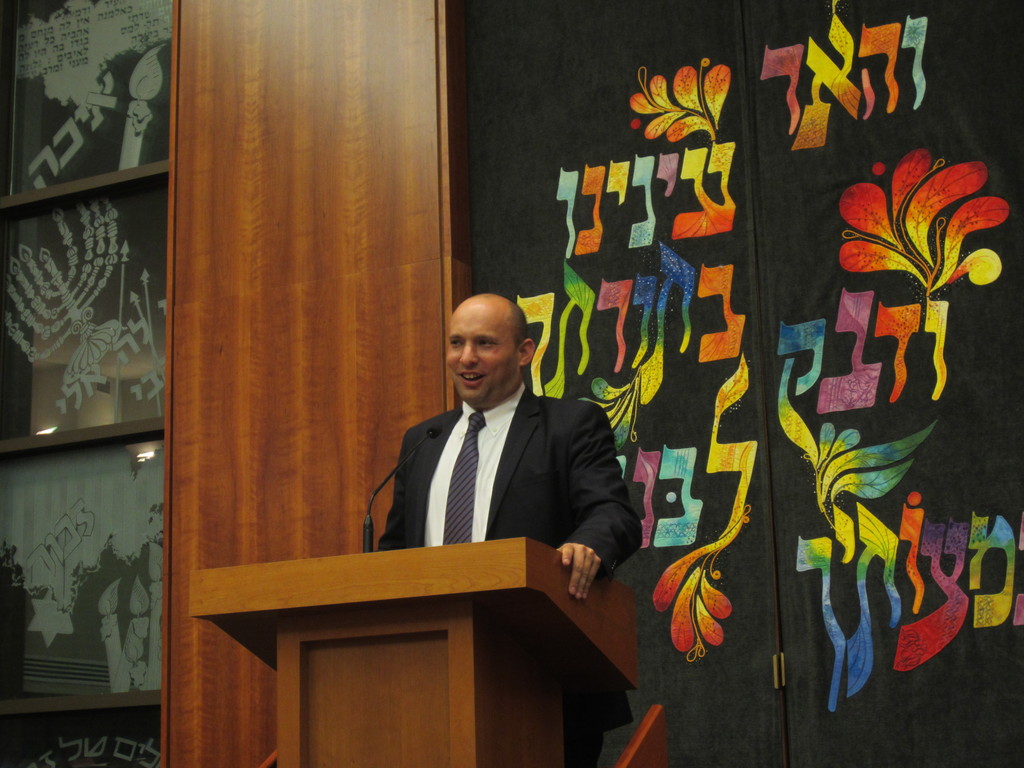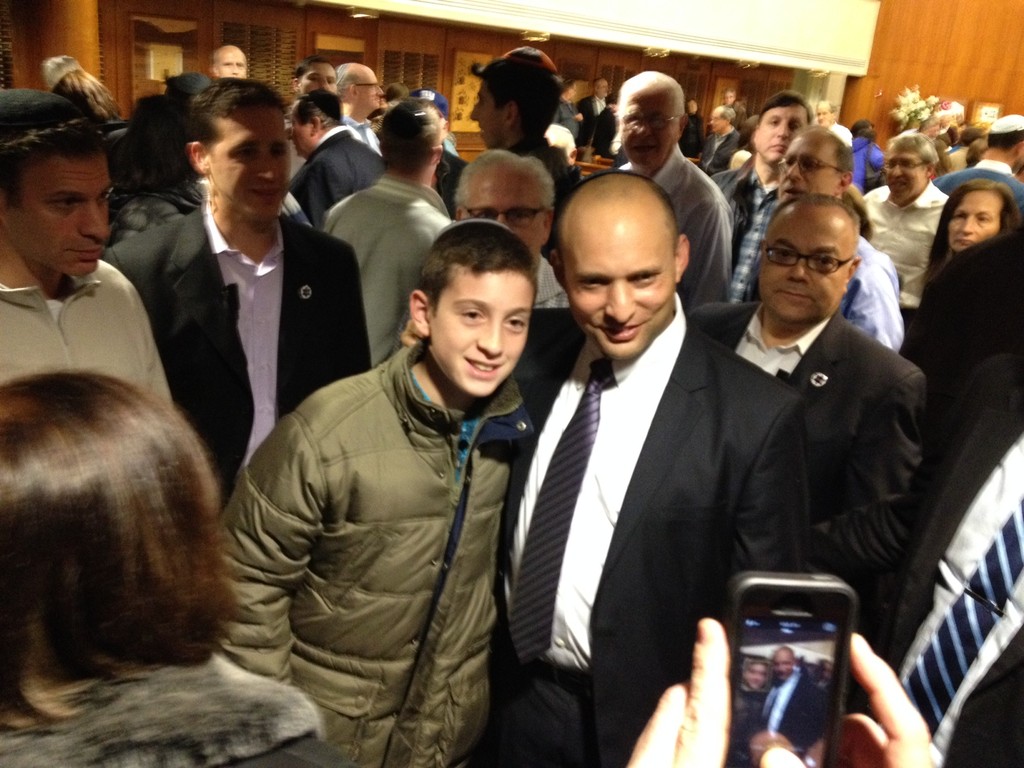‘Israel will defend itself’
MK Bennett reminds Woodmere YI that Torah is Israel’s raison d’être
Naftali Bennett, pivotal Knesset member and head of the Jewish Home party, warned of the continuing Iranian threat and the importance of the eternity of Israel in a 35 minute speech Saturday night at the Young Israel of Woodmere.
He stressed the importance of Israel as the home of the Jewish people and not just as a “shelter state” and that Israel is a “lighthouse in the storm” of the turbulent Middle East.
“Is Israel really the safest place for Jews?” he asked. “There are other places: Teaneck, New Jersey; Woodmere; Perth, Australia. If our whole meaning is to be a shelter state, that’s not a good enough reason. There is a better reason — it’s the Torah [that is Israel’s] raison d’être.”
Bennett said the principal mission of his current U.S. visit is to raise alarms over the crisis with Iran.
“They don’t want to break out now, they want to keep the pipeline and are waiting for the right moment, when the sanctions are relieved, when the West is preoccupied with something. Maybe in 10 months, 20 months, but the moment they break out it is done ala North Korea. The current deal of the P5+1 is a bad deal. They can keep the ability to break out at any given moment. A good deal would be to dismantle the whole thing. Then it would take them three years to rebuild from scratch.”
“In any event,” he continued, “Israel has the capability to defend itself and Israel will defend itself.”
He discounted current negotiations with the Palestinians, noting that the talks represent fewer than half of the Palestinians and that it “doesn’t make sense” to give up land especially since Hamas would continue fighting anyway.
Bennett said the Second Lebanon War in 2006 was a turning point for him. He saw homes in Lebanon with “a kitchen, family room, children’s room — and rocket room” with a rocket launcher — the roof pulls back, the launcher is fired, and then covered again, he said.
“I kept asking myself, ‘what do they want — why are they shooting missiles at my parents’ home in Haifa?’ They just don’t want us there [in Israel],” he concluded.
During the war he noticed that “something was missing — not tactics, not ammunition, but spirit.” He said that it was after the expulsion of the Jews from Gush Katif [in Gaza in 2005] and the army was demoralized. He was “shaken” and decided rather than go back to hi-tech business, he entered politics as Binyamin Netanyahu’s chief of staff, with a goal of “restoring the Jewish soul to the nation of Israel.” He said that “50 percent of new recruits have never been to the Kotel Hamaaravi,” and “if you don’t know why you are fighting how are you going to fight?”
He joined the Bayit Yehudi (Jewish Home) party after founding various groups to increase Zionism and dialogue between religious and secular Israelis. His party won 12 seats, becoming a major force in forming the next government. He stressed the need for education that “every kid should not only visit the Kotel” but know our history — “Avraham, Yitchak, Yaakov, Moshe, David, Shlomo … to Yoni Netanyahu and Chana Senesh, Netzach Yisrael (the eternity of Israel).”
The “Arab spring morphed into the Moslem winter,” ushering in an “era of chaos, a Moslem storm” that is “here to stay,” he said. But, he continued, “Israel is the lighthouse in the storm” with a “3,800 year history, a strong economy, the most powerful military [in the area], strong foundations.” Israel also “projects light with seven million Israeli Arabs with rights, women who can drive, and where people can protest.”
The Jewish Star met with Bennett in March 2012 for a personal interview arranged by the World Committee for the Land of Israel. At the time, he warned of Iran’s efforts to get nuclear capability and called for “crippling sanctions” against Iran. He said then that they might work but that Israel would defend itself and would not “outsource our existence.”
At the Young Israel of Woodmere, Bennett said that Iranian President Hassan “Rouhani has to face a clear decision: either retain the nuclear or relieve the sanctions — there is no third way.”
Failure may mean that, “G-d forbid, a nuclear suitcase would blow up in an American city or nuclear missiles from Teheran hit Paris or Tel Aviv.”
“The entire Arab world is saying if Iran gets a weapon we’ll get a weapon. We think this is the time for the free world to stand strong and not to let up,” Bennett said.
The men and women who filled the main sanctuary of YI Woodmere on motzei Shabbat listened raptly as Bennett detailed his background and launched into a discussion of Israel with humorous asides and quips. He described the tremendous strides in research and the economy Israel is making for itself and the world, citing Israel’s export of “water technologies, agriculture, energy, cyber security, throughout the world, India, China, Africa, Eastern Europe.”
Bennett was born in 1972 in Israel, grew up in the 1980s in a “regular childhood” during a period when many “took Israel for granted.” He grew up modern Orthodox in Haifa, his parents olim from California, and was a madrich (group leader) in Bnei Akiva. Bennett served in the Israel Defense Forces in Sayeret Matkal, an elite unit, and is a Major in the reserves. He came to the U.S., worked in hi-tech, was cofounder and CEO of Cyota, an anti-fraud software company that he sold in 2005, making him a multimillionaire. He was a part of other hi-tech ventures in Israel as well.
Bennett said he owes “a huge debt of gratitude” to the U.S. and explained that when he and his wife Gilat moved to Manhattan they joined Kehilath Jeshurun’s beginner’s minyan, facilitating Gilat’s transformation from secular to Orthodox. He commended the mutual respect evident at the minyan.
“In Israel, we need to learn from you,” he added.

 55.0°,
Mostly Cloudy
55.0°,
Mostly Cloudy 







